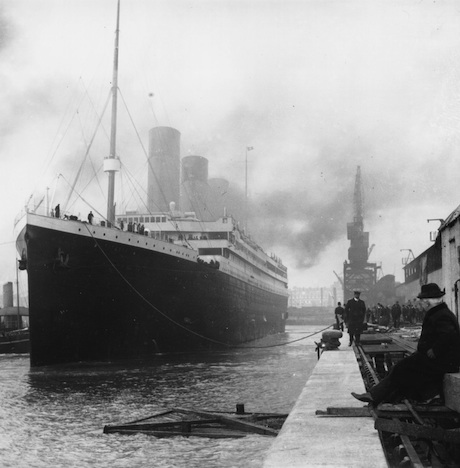Rachel Zucker asks, “Is it more important to you that your poems be timeless or timely and why?”
Even as I suspected this question of positing a false dichotomy, my mind couldn’t help but slice it into two dichotomous halves.
One half I contemplated in political terms (maybe partly inspired by Mark Nowak’s piece). I am in a book club that reads both “timeless” “classics” and “contemporary” “bestsellers”—categories which, of course, can and do overlap—and we just finished Cloud Atlas by David Mitchell. At one point, Mitchell has a minor character write in his notebook:
Exposition: the workings of the actual past + the virtual past may be illustrated by an event well known to collective history, such as the sinking of the Titanic. The disaster as it actually occurred descends into obscurity as its eyewitnesses die off, documents perish + the wreck of the ship dissolves in its Atlantic grave. Yet a virtual sinking of the Titanic, created from reworked memories, papers, hearsay, fiction—in short, belief—grows ever truer. The actual past is brittle, ever-dimming + ever more problematic to access + reconstruct: in contrast, the virtual past is malleable, ever-brightening + ever more difficult to circumvent/expose as fraudulent. The present presses the virtual past into its own service, to lend credence to its mythologies + legitimacy to the imposition of will. Power seeks + is the right to “landscape” the virtual past. (He who pays the historian calls the tune.)
Harmless case of the virtual past in point: One of my poetry students recently sent me a poem that described young poets attempting to avoid being too selfish or narrow with the image of “sea birds flying/ over the Titanic’s flaming metallic hulk, / half-submerged like an Oreo floating in milk."
The other half of the question I contemplated in personal terms. In Todd Haynes’ recent film I’m Not There, six characters represent different facets of Bob Dylan’s life and work; one of them, played by Ben Whishaw (aka the actor who plays John Keats in Bright Star) offers “seven simple rules of going into hiding,” the sixth and seventh of which are “never do anything the person standing in front of you cannot understand” and “never create anything, it will be misinterpreted, it will chain you and follow you for the rest of your life.”
Maybe regardless of what you write, you are doomed—if intelligibility is your primary goal—to be misunderstood, and this misunderstanding is, at best, your version of immortality, if you should be so lucky.
The lyric poem itself—with its assertion of the private experience of a perceiving “I”—can be profoundly egalitarian and democratic, suggesting as it does that everybody’s experiences (not just those of gods, kings, heroes, elites) matter and have value, and that this value can be both timely and timeless. And all poets get thrown out of the Republic by Plato, no matter what they’re writing. But the overtly political and/or didactic poem can be successful as well—topical yet classic simultaneously—as plenty of examples by Naomi Shihab Nye, Adrienne Rich, Allen Ginsberg, Audre Lorde, Langston Hughes, Wilfred Owen and many more attest.
So I guess my answer is—as it almost always is—that I want to read and write both. Sometimes I want to listen to Riot Grrrl anthems in which Kathleen Hanna isn’t aiming—nor should she be—for subtlety. Other times I want to listen to quiet singer-songwriter stuff where, say, Elliott Smith isn’t aiming—nor should he be—for ideological clarity. Both can move me to tears, to thought, to action. Both can last and last and last.
p.s. And speaking of timely, Emily Warn, I like what you’re doing in response to the O fashion spread featuring poets. What’s been interesting to me in terms of the critical reaction to that aspect of the poetry issue of the magazine is that I’m not sure most people taking offense to it realize that Oprah's "using" poets to "sell" poetry/fashion is not some exceptional or desperation move. In most issues, she does a fashion spread along those lines where she has real-life attractive, professional women (social workers, teachers, doctors and so forth) doing the same thing: modeling pricey pieces of clothing that are not theirs. Typically, these women are far more diverse—in terms of age, race, and size—than the models you see in other fashion and women’s magazines. So I’m not totally sure how David Orr, for example, was able to withstand all the O fashion spreads until now, and why he only recently felt compelled to call this approach to fashion “apocalyptic.”
Kathleen Rooney is a founding editor of Rose Metal Press, a publisher of literary work in hybrid genres...
Read Full Biography


